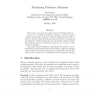Free Online Productivity Tools
i2Speak
i2Symbol
i2OCR
iTex2Img
iWeb2Print
iWeb2Shot
i2Type
iPdf2Split
iPdf2Merge
i2Bopomofo
i2Arabic
i2Style
i2Image
i2PDF
iLatex2Rtf
Sci2ools
114
click to vote
IMPERIAL
1993
1993
Prioritising Preference Relations
We describe some ideas and results about the following problem: Given a set, a family of \preference relations" on the set, and a \priority" among those preference relations, which elements of the set are best? That is, which elements are most preferred by a consensus of the preference relations which takes account of their relative priority? The problem is posed in a deliberately general way, to capture a wide variety of examples. Our mainresult gives su cient conditions for the existence of `best' elements for an importantinstance ofthe problem: preference relations are pre-orders, the priority amongthem is a partial order, and the definition of best elements uses a generalisation of lexicographic ordering.
Formal Methods | IMPERIAL 1993 | Preference Relations | Su Cient Conditions | \preference Relations |
Related Content
| Added | 09 Aug 2010 |
| Updated | 09 Aug 2010 |
| Type | Conference |
| Year | 1993 |
| Where | IMPERIAL |
| Authors | Mark Ryan |
Comments (0)

